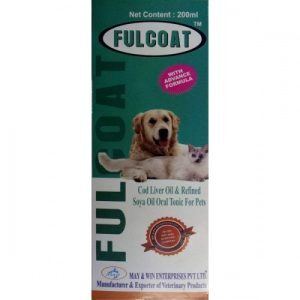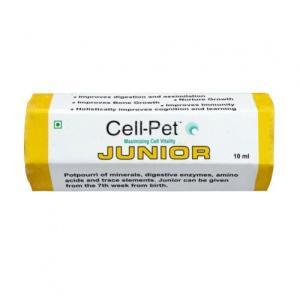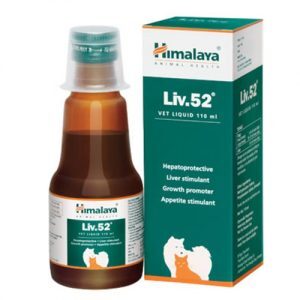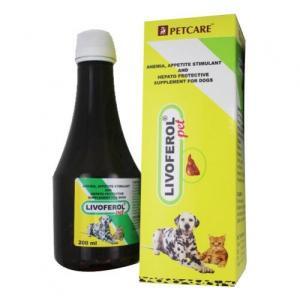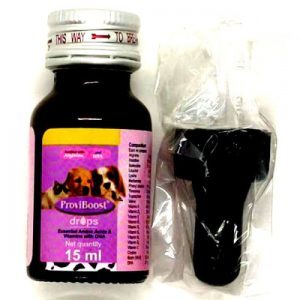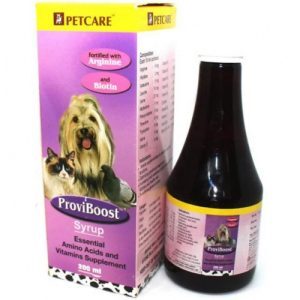Table of Contents
Digestive issues in cats and dogs can range from mild problems like upset stomach and diarrhea to more serious conditions such as gastrointestinal infections or inflammatory bowel disease (stomach inflammation in dogs and cats). It is important to treat gastrointestinal problems in dogs and cats to alleviate discomfort, prevent further complications, and maintain their overall health and well-being.
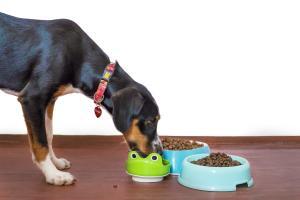
Symptoms of Digestive Problems in Pets?
Do dogs and cats get stomach aches? Yes, they do. They may have dog or cat stomach spasms. Cat and dog upset stomach symptoms can vary, but common signs include the following:
- Vomiting: This can be occasional or persistent and may contain undigested food, bile, or foam.
- Diarrhea: Another sign of stomach issues in dogs and cats is frequent loose or watery stools, sometimes accompanied by mucus or blood.
- Loss of appetite: A decreased interest in food or complete refusal to eat. Ask your veterinarian what to do if your dog won’t eat and has diarrhea.
- Weight loss: Unexplained or gradual weight loss despite a normal or increased appetite.
- Abdominal pain or discomfort: Pets may exhibit signs of discomfort such as restlessness, pacing, hunching, or sensitivity when their abdomen is touched.
- Excessive gas: Increased flatulence or belching.
- Bloating: Swelling or distension of the abdomen, which can be accompanied by discomfort.
- Constipation: Difficulty passing stools or infrequent bowel movements.
- Changes in stool consistency or color: Stools may become harder, softer, more frequent, or less frequent than usual. They may also appear pale, dark, bloody, or have an abnormal odor.
These symptoms can indicate various underlying digestive issues, and it’s always best to consult a veterinarian for a proper diagnosis and treatment, especially when treating stomach issues in older or small dogs and cats.
When to Call a Vet
You should consider calling a vet if your pet experiences any of the following situations.
If your pet is experiencing persistent vomiting, diarrhea, or other digestive issues that don’t improve or worsen over time, if your pet shows signs of dehydration, seeking veterinary attention promptly is important. Signs of dehydration include dry gums, sunken eyes, lethargy, and decreased skin elasticity.
Blood in the stool or vomit can indicate a more serious underlying issue and should be evaluated by a veterinarian.
If your pet refuses to eat for more than 24 hours or shows a significant decrease in appetite, it’s important to seek veterinary advice.
If your pet exhibits signs of abdominal pain, such as restlessness, pacing, or sensitivity to touch, it’s recommended to consult a vet. He will recommend dogs’ stomach ache remedies.
If your pet becomes unusually lethargic, weak, or shows other concerning changes in behavior or condition, it’s advisable to contact a veterinarian.
Suppose your pet has pre-existing health conditions, such as diabetes or kidney disease, and experiences digestive problems. In that case, it’s important to consult a vet as it may require special attention and management.
Remember, it’s always better to seek veterinary advice if you have concerns about your pet’s digestive health. A veterinarian can provide appropriate guidance, diagnosis, and treatment for your furry friend.
Causes of Gastrointestinal Issues in Cats and Dogs
What causes stomach issues, diarrhea, and vomiting in dogs and cats?
Here are possible causes of gastrointestinal issues in cats and dogs:
- Food-Related Causes: Dietary changes, food allergies or intolerances, ingestion of spoiled or contaminated food, dietary indiscretion (eating garbage or non-food items), or sudden changes in diet can lead to gastrointestinal issues.
- Diarrhea Caused by Stress: Cats and dogs can develop diarrhea as a response to stress, such as changes in routine, new environments, or separation anxiety. If you need more information, ask the veterinarian what is gi distress.
- Infectious Causes: Gastrointestinal issues can be caused by various infectious agents, including different types of intestinal bacteria in dogs and cats (such as Salmonella or Campylobacter), viruses (such as parvovirus in dogs or feline panleukopenia virus in cats), and parasites (such as Giardia or worms).
- Inflammatory Conditions: Inflammatory bowel disease (IBD) is a common cause of chronic gastrointestinal issues in cats and dogs. It involves chronic inflammation of the gastrointestinal tract, leading to symptoms like vomiting, diarrhea, and weight loss.
- Toxic Ingestions: Ingestion of toxic substances like certain plants, human medications, cleaning products, or chemicals can result in gastrointestinal problems in pets.
- Pancreatitis in Dogs and Cats: Pancreatitis is pancreas inflammation and can cause gastrointestinal symptoms such as vomiting, diarrhea, and abdominal pain. Dietary indiscretion, high-fat diets, or underlying health conditions can trigger it. Contact your veterinarian about enteritis in dogs and enterocolitis in dogs and cats.
- Canine and Feline Cancer: Certain cancers, such as gastrointestinal lymphoma or adenocarcinoma, can affect the digestive system in cats and dogs, leading to gastrointestinal issues like vomiting, diarrhea, weight loss, and loss of appetite. Ask your veterinarian for more dog intestinal cancer symptoms.
This is not an exhaustive list, and there can be other causes of gastrointestinal issues in cats and dogs, like dog upset stomach from antibiotics or severe stomach issues in dogs and cats. If you notice chronic stomach issues in dogs and cats, it’s best to consult a veterinarian for a proper diagnosis and appropriate treatment.
How to Diagnose Stomach and Digestive Problems in Pets
Diagnosing stomach and digestive problems in pets typically involves several steps.
A thorough physical examination allows the veterinarian to assess your pet’s overall health, check for any abnormalities, and gather important information about the symptoms.
Providing a detailed medical history, including the onset and duration of symptoms, any recent dietary changes or exposure to toxins, and information about your pet’s vaccination and deworming history, can assist the veterinarian in identifying potential causes.
Depending on the specific symptoms and suspected underlying causes, the veterinarian may recommend one or more diagnostic tests, such as:
- Blood tests: These can help evaluate organ function, check for signs of infection, assess inflammation levels, and detect certain diseases.
- Fecal analysis: Examining a stool sample can identify parasites, bacteria, or abnormal intestinal flora that may be causing gastrointestinal issues.
- Imaging studies: X-rays, ultrasound, or endoscopy may be used to visualize the digestive tract and identify obstructions, tumors, or structural abnormalities.
- Biopsy: If inflammatory bowel disease or cancer is suspected, a tissue sample may be obtained through endoscopy or exploratory surgery for further analysis.
- Food trials: In cases of suspected food allergies or intolerances, a food trial may be conducted to determine if specific ingredients trigger digestive problems.
Sometimes, a veterinarian may recommend what to give dogs for vomiting and diarrhea based on the clinical presentation and response to initial interventions. If the symptoms improve with treatment, it can provide additional evidence to support a specific diagnosis.
The diagnostic process may vary depending on the individual case, and your veterinarian will determine the most appropriate diagnostic approach based on your pet’s specific situation.
Treatment for Digestive Issues in Cats and Dogs
How to treat dog diarrhea and vomiting?
The cure for upset stomach in dogs and cats may involve dietary changes, medication, probiotics, hydration support, and addressing underlying causes to alleviate symptoms and promote gastrointestinal health.
Let’s check the best medicines and supplements veterinarians recommend to help treat digestive issues in cats and dogs, including puppy stomach upset remedies.
FulCoat (Cod Liver Oil, Soya Oil), 200ml
FulCoat is a natural remedy for stomach issues in dogs and cats containing cod liver oil and soya oil, typically used for improving coat and skin health in cats and dogs, but it is also used to treat stomach and gut ulcers in pets. It is particularly beneficial for pets with nutrient deficiencies.
Active Ingredients
- Cod Liver Oil: It is a rich source of omega-3 fatty acids, including EPA (eicosapentaenoic acid) and DHA (docosahexaenoic acid), which have anti-inflammatory properties and promote healthy skin and coat.
- Soya Oil: It is a vegetable oil that provides additional essential fatty acids, primarily omega-6 fatty acids like linoleic acid, which are important for maintaining overall health.
How It Is Used
FulCoat is typically administered orally by adding it to the pet’s food. The specific dosage and administration instructions may vary, so it’s important to follow the instructions provided by the manufacturer or as directed by your veterinarian. It usually comes in a liquid form and is available in different bottle sizes. Generally, FulCoat is used daily or as advised by the veterinarian. Consistency is key; observing noticeable improvements may take several weeks or months.
Benefits
- The omega-3 fatty acids in cod liver oil have anti-inflammatory properties that may benefit pets with allergies or inflammatory conditions.
- It helps to treat stomach and gut ulcers in pets and improves overall health conditions.
- The omega-3 and omega-6 fatty acids in FulCoat help nourish the skin and hair follicles, promoting a healthy and lustrous coat. These essential fatty acids can help improve skin hydration, reduce itchiness and inflammation, and support a healthier skin barrier.
- FulCoat can help reduce excessive shedding and promote a healthier shedding cycle by providing the necessary nutrients.
Cell-Pet Junior (Oxygen, Minerals, Enzymes, and Amino Acids), 10ml
Cell Pet Junior is a liquid concentrate formulated with colloidal minerals and nutritional supplements. It is designed to be added to your pet’s daily drinking water. This product supports bone development, aids digestion, and enhances the immune system.
Active Ingredients
Cell Pet Junior contains a combination of beneficial ingredients, including oxygen, minerals, enzymes, and amino acids:
- Oxygen plays a vital role in cellular respiration and metabolism. It helps support the overall functioning of cells, tissues, and organs, promoting optimal health and vitality in pets.
- Colloidal minerals are micronutrients essential for various biological processes in the body.
- Enzymes are proteins that facilitate and accelerate biochemical reactions in the body. They aid in digestion, allowing the breakdown of food components into smaller, more easily absorbed nutrients. Enzymes can support optimal nutrient absorption and help improve digestive efficiency.
- Amino acids are the building blocks of proteins and play a crucial role in many physiological functions. They are involved in tissue growth, repair, and maintenance, support immune function, and contribute to various metabolic processes.
Cell Pet Junior aims to provide supplemental support to your pet’s nutritional needs by including these ingredients, promoting healthy growth, digestion, and overall well-being.
Benefits
Cell Pet Junior is formulated to ensure a high absorption rate of up to 95% into the bloodstream. It aids in digestion, allowing for efficient nutrient uptake. Additionally, it supports and enhances the immune system, promoting a stronger defense against illnesses and maintaining overall health.
Liv.52 Vet Liquid (Caper Bush, Chicory), 110ml
Liv.52 Vet Liquid is a veterinary supplement containing Caper Bush and Chicory as active ingredients. Liv.52 Vet Liquid is commonly used to support liver function and promote healthy digestion in cats and dogs. It is a supportive therapy for liver diseases, including hepatitis, cirrhosis, and toxicity caused by medications or toxins. Liv.52 Vet Liquid can aid digestion and improve nutrient absorption in pets with digestive disorders, such as loss of appetite, indigestion, or mild constipation.
Active Ingredients
- Caper Bush has hepatoprotective properties, which help protect and support the liver. It aids in maintaining liver function and promoting its overall health.
- Chicory is known for its digestive properties. It helps properly digest and assimilate nutrients, promoting healthy gastrointestinal function.
How It Is Used
Liv.52 Vet Liquid is typically administered orally by mixing it with the pet’s food or directly into the mouth. The specific dosage and administration instructions may vary based on the pet’s size, weight, and the veterinarian’s recommendation. It usually comes in a liquid form and is available in different bottle sizes. Liv.52 Vet Liquid is generally given daily or as the veterinarian directs.
Benefits
- Liv.52 Vet Liquid helps maintain liver health, protect liver cells from damage, and aid in liver regeneration, thus supporting overall liver function.
- The digestive properties of Liv.52 Vet Liquid help improve digestion, enhance nutrient absorption, and promote gastrointestinal health in cats and dogs.
- By supporting liver function and digestion, Liv.52 Vet Liquid contributes to pets’ overall well-being, helping them maintain good health and vitality.
Livoferol Pet (Ferrous Gluconate, Ferrous Chloride, Riboflavine), 200ml
Livoferol Pet is a pet supplement that contains Ferrous Gluconate, Ferrous Chloride, and Riboflavine (Riboflavin) as its active ingredients. Pet Care Livoferol Supplement enhances liver function by regulating hepatic microsomal enzymes. This supplement promotes a healthy liver, improving appetite, digestion, and sleep in pets. Additionally, Livoferol contains Vitamin B, which supports metabolic processes in your pet’s body, contributing to overall well-being.
Active Ingredients
- Ferrous Gluconate and Ferrous Chloride: These are forms of iron compounds. Iron is essential for producing hemoglobin, which carries oxygen in the blood. It plays a crucial role in forming red blood cells and overall oxygen transport in the body.
- Riboflavine (Riboflavin): Riboflavin is a B vitamin important for various metabolic processes. It supports energy production, helps in the utilization of iron, and contributes to overall cellular health.
How It Is Used
Livoferol Pet is typically administered orally by adding it to the pet’s food or directly into the mouth. The specific dosage and administration instructions may vary based on the pet’s size, weight, and the veterinarian’s recommendation. It usually comes in a liquid form and is available in different bottle sizes.
In general, the veterinarian gives Livoferol Pet daily or as directed.
Benefits
- The supplement improves appetite, digestion and supports metabolic processes.
- Livoferol Pet helps address iron deficiency anemia in pets by providing supplemental iron, which aids in producing red blood cells and improves oxygen-carrying capacity.
- By supporting the production of red blood cells and enhancing oxygen transport, Livoferol Pet can help alleviate symptoms of anemia, such as weakness and fatigue, leading to improved energy levels in pets.
- Overall Health: Adequate iron levels are essential for proper cellular function and overall pet health. Livoferol Pet supports optimal iron levels, contributing to the pet’s overall well-being.
ProviBoost Drops (Arginine, Histidine, Isoleucine, Leucine, Lysine, Vitamins), 15ml
ProviBoost Drops is a supplement containing Arginine, Histidine, Isoleucine, Leucine, Lysine, and Vitamins as its active ingredients. ProviBoost Drops are commonly used as a nutritional supplement to support overall health and well-being in cats and dogs. It improves your pet’s metabolic and physiological functions and provides essential amino acids and vitamins necessary for young pets’ healthy growth and development. It can provide additional nutrients during periods of increased nutritional requirements, such as recovery from illness, post-surgery, or during pregnancy and lactation.
Active Ingredients
- Arginine is an amino acid crucial in protein synthesis, immune function, and wound healing. It supports the growth and repair of tissues, aids in the production of enzymes, and helps maintain overall health.
- Histidine is an essential amino acid involved in various physiological processes. It contributes to the production of red and white blood cells, supports tissue repair, and plays a role in synthesizing important molecules such as histamine.
- Isoleucine, Leucine, and Lysine are essential amino acids necessary for protein synthesis, tissue repair, and overall growth and development. They play important roles in muscle function, immune system regulation, and the production of enzymes and hormones.
- The specific vitamins included in ProviBoost Drops may vary depending on the product formulation. Vitamins are essential micronutrients that play critical roles in various bodily functions, including metabolism, energy production, immune system function, and overall well-being.
How It Is Used
ProviBoost Drops are typically administered orally by adding the appropriate dosage to the pet’s food or directly into the mouth. The specific dosage and administration instructions may vary based on the pet’s size, weight, and the veterinarian’s recommendation. It usually comes in a liquid form with a dropper or measured dispenser for accurate dosing. ProviBoost Drops are given daily or as directed by the veterinarian.
Benefits
- The vitamins and amino acids support metabolic processes, helping pets efficiently utilize nutrients for energy production and maintaining overall vitality.
- ProviBoost Drops provides essential amino acids and vitamins that support overall nutrition and contribute to optimal growth, development, and overall pet health.
- The supplement helps enhance the immune system’s function, aiding in better defense against infections and promoting overall well-being.
- The amino acids in ProviBoost Drops play important roles in tissue repair, muscle development, and overall growth, ensuring pets have the necessary building blocks for healthy tissues and organs.
ProviBoost Syrup (Arginine, Histidine, Isoleucine, Leucine, Lysine, Vitamins), 200ml
ProviBoost Syrup is a nutritional supplement containing Arginine, Histidine, Isoleucine, Leucine, Lysine, and Vitamins as its active ingredients. ProviBoost Syrup is a pet supplement that promotes vitality and enhances the physical well-being of your pets. It contains essential amino acids, Docosahexaenoic Acid (DHA), and Omega-3 fatty acids, including arginine and biotin. These ingredients play crucial roles in your pet’s health, including weight gain, boosted immunity, nervous system development, skeletal growth, and maintaining a shiny, lustrous, and healthy skin coat.
Active Ingredients
They are the same as in ProviBoost Drops.
How It Is Used
ProviBoost Syrup is typically administered orally by measuring the appropriate dosage and administering it directly into the pet’s mouth or mixing it with food. The syrup is available in a bottle with a measured dispenser for accurate dosing. ProviBoost Syrup is given daily or as directed by the veterinarian.
Benefits
- The vitamins and amino acids support metabolic processes.
- Nutritional Support: ProviBoost Syrup provides essential amino acids and vitamins to support overall nutrition, promoting optimal growth, development, and overall pet health.
- Immune System Support: The supplement helps enhance the immune system’s function, aiding in better defense against infections and promoting overall well-being.
- Tissue Repair and Growth: The amino acids in ProviBoost Syrup play important roles in tissue repair, muscle development, and overall growth, ensuring pets have the necessary building blocks for healthy tissues and organs.
- Energy Production: The vitamins and amino acids support metabolic processes, helping pets efficiently utilize nutrients for energy production and maintaining overall vitality.
It’s important to consult a veterinarian before starting new pet supplements. They can provide specific dosage recommendations and determine your pet’s health needs.
How to Prevent Digestive Problems in Pets
Preventing digestive problems in pets involves adopting certain practices and providing them with a balanced diet and appropriate care.
Feed your pet a balanced, high-quality diet suitable for their age, breed, and specific dietary needs. Ensure it includes appropriate amounts of fiber, protein, and essential nutrients.
When transitioning to a new diet or introducing new foods, do so gradually over a few days to allow your pet’s digestive system to adjust. Avoid sudden changes in your pet’s diet, as this can disrupt their digestion. If you need to switch their food, gradually mix increasing amounts of the new food with the old food over several days.
Limit feeding your pet table scraps or human food as it can lead to digestive upset and may not provide the necessary nutrition. Ensure proper portion control to prevent overeating or obesity, which can contribute to digestive problems. Follow feeding guidelines based on your pet’s age, weight, and activity level.
Ensure your pet has access to clean, fresh water at all times to prevent dehydration and aid digestion.
Regular exercise helps promote healthy digestion and prevents obesity, which can contribute to digestive issues.
Minimize stress and anxiety in your pet’s environment, as stress can contribute to digestive problems. Provide a calm and secure living environment.
Schedule regular veterinary check-ups to monitor your pet’s overall health and catch any potential digestive issues early on.
Keep your pet protected from parasites such as fleas, ticks, and intestinal worms, as they can lead to gastrointestinal problems. Use appropriate preventive medications and follow a deworming schedule recommended by your veterinarian.
Store pet food in a cool, dry place to prevent spoilage and the growth of bacteria that can cause digestive issues.
Following these preventive measures can help maintain your pet’s digestive health and reduce the likelihood of digestive problems.
FAQ
Can Pets Get Stomach Bugs from Humans?
While uncommon, some illnesses caused by certain viruses or bacteria can be transmitted from humans to pets. However, most stomach bugs are species-specific, primarily affecting humans or animals. Maintaining good hygiene practices and avoiding close contact between sick humans and pets is generally recommended to minimize the risk of transmission.
Can Cats and Dogs Get the Stomach Flu?
The term “stomach flu” typically refers to viral gastroenteritis, commonly found in humans. Cats and dogs can experience gastrointestinal issues, often caused by other factors such as dietary changes, infections, or inflammatory conditions. If your pet shows signs of gastrointestinal distress, it’s best to consult a veterinarian to determine the underlying cause and appropriate treatment.
What Can You Give a Dog or a Cat for Stomach Ache?
How to help a dog’s stomach ache? It is essential to consult a veterinarian before giving any medication or remedies to your dog or cat for a stomach ache. The appropriate treatment will depend on the underlying cause of the stomach ache. In some cases, the veterinarian may recommend withholding food for a short period to allow the stomach to settle. They may also suggest a bland diet, probiotics, or prescription medications to address specific gastrointestinal issues.
Can Stomach Issues Cause Bad Breath in Dogs?
Yes, stomach issues can contribute to bad breath in dogs. Digestive problems, such as gastrointestinal infections, dietary indiscretion, or inflammatory conditions, can produce foul-smelling gases or compounds in the stomach, resulting in an unpleasant breath odor. Treating the underlying stomach issue can help improve the breath odor.


